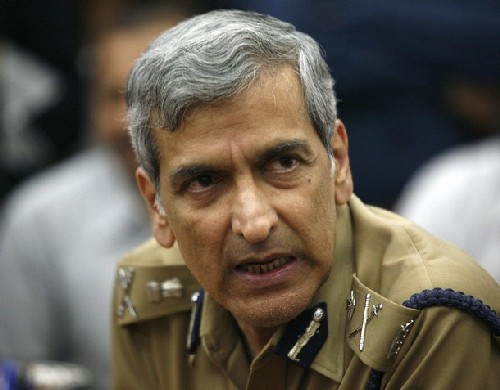|
|
the-south-asian.com January - March 2009 |
|
|||
|
Five Main Targets - CST
Taj
- Mumbai's
|
|
||||
|
A conversation with Hasan Gafoor – Commissioner of Police, Mumbai
"What matters is - we stood up, we fought, we sacrificed. We gave our best – and we succeeded."
I had been speaking to Mumbaikers from all walks of life,
about the tragic 26/11 events that had left the city shocked and angry.
Their views and opinions were varied and diverse. But I was looking for the
real story from the man who had found himself in the thick of it all. I
finally managed to get a few minutes with Hasan Gafoor, the Police
Commissioner of Mumbai. This article is based on our conversation in Mumbai.
The carefully crafted Mumbai terrorist carnage left the nation shell shocked and numb with disbelief at its atrocity, audacity and daring. People across the world expressed solidarity. Incredulity, bewilderment and anger took hold and those that had lost their near and dear ones were left bereft and inconsolable. Mumbai united in grief, perhaps as never before. Prayer services, candle lit vigils, tales of compassion, forbearance, courage and ultimate sacrifice, political bashing and finger pointing all became part of the scene. Coverage by the media went beyond responsible reporting as cameras recorded and relayed every gruesome and operationally important detail, like a ball-by-ball commentary, which was both cruel and disturbing and may well have acted as an impediment to police operations, as well as a media feed for the terrorists. From all accounts, Mumbai police had responded to the attack promptly and valiantly. The men in uniform had taken the fight to the terrorists and in the exchange lost brave policemen and some of the outstanding officers in the force. There were many unanswered questions and I wanted to put them across to Gafoor. Lean, wiry, and tall in physique; and gentle and unassuming in demeanour - his reputation for honesty and integrity is a talking point with Mumbaikers. He is affable and soft spoken but when it comes to work he can be tough and unrelenting, as his colleagues point out. As the conversation takes its course one starts to see the officer in him; his mental strength, his calmness under adversity, his resolute character confirm his professional stature. Since 26/11 he has been in the news regularly although he shuns publicity per se and believes in keeping a low profile and getting on with his job. I had previously learned that amongst the first steps he had taken when he became the Police Commissioner was to remove the escort jeep that accompanied police commissioners for their protection. He felt that as an officer responsible for the security of Mumbaikers he did not want to surround himself with security guards. As we sat in his impressive and orderly office with an almost paper free desk, I threw questions at him and he replied - at times with openness and at times with restraint and gravely. In Hemant Karkare, Vinod Kamte and Vijay Salaskar, Gafoor had lost his key officers and the pain of this loss was visible as these names came up in our conversation. What was uppermost on your mind as the events of 26/11 unfolded? HG - To evacuate and save as many people as one could as the targeted locations were teeming with people. This attack was unlike any other for we were not just dealing with bomb blasts but with terrorists who were shooting indiscriminately with sophisticated assault weapons and using bombs and grenades with intent to kill and as a diversionary tactic. It was a situation that was unique in world terrorism. Since the attack, senior police officers have been coming from US, UK, France, Israel, to study the case. Did you, at any time, think that it would last 60 hrs? HG -Not really. As a matter of fact one really did not know how long it would last because the buildings under siege were high rise, which allowed the terrorists to keep moving and locate different vantage points and these contained many people that required the police and commando operation to move with care and caution so that lives were not endangered. Was the Mumbai police prepared for such an eventuality or was there an element of surprise? HG - My Deputy Commissioner was at the Taj within seven minutes of the start of the attack, and I reached the Oberoi within 20 minutes . The response of the Mumbai police was unprecedented in the world. My officers and constables came on their own from their offices and homes in different parts of the city to provide operational support, and many of them did not have weapons. They said they wanted to fight and do their duty. The lone terrorist who was taken alive was caught by Tukaram Ombale, an unarmed ASI who disarmed him of his assault rifle AK 47 and clung on to him even in death as five bullets were pumped into his head by the other terrorist. Other policemen killed the terrorist who had shot Ombale and captured the sole survivor who is today the country’s most prized prisoner. This display of response and courage is unheard of. I am very proud of my men not just as their chief but also as a Mumbaiker. Read the complete interview in the current issue of The South Asian Life & Times
|
|||||
|
Copyright © 2000 - 2009 [the-south-asian.com]. Intellectual Property. All rights reserved. |
|||||
